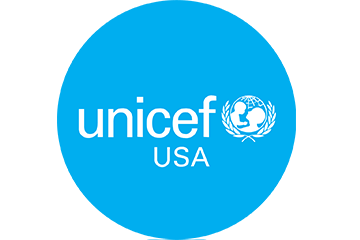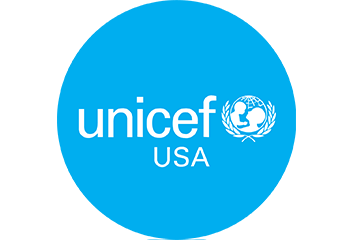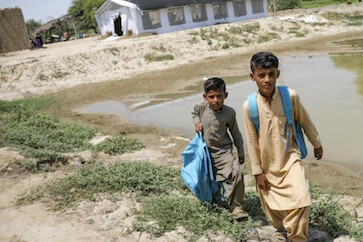In February 2021, Ghana received the first batch of COVID-19 vaccines provided through the COVAX, a ground-breaking global collaboration committed to the development, production and equitable distribution of vaccines around the world.
As the first shots reached the arms of Ghanaians, the country’s president reflected on the moment.
“COVID-19 has changed the world. It has cost lives, battered health systems, and damaged livelihoods,” President Nana Akufo-Addo said. “But through these challenges, we have seen the best of humanity exemplified through strong multilateral cooperation.”
In far-western Nepal, healthworker Ravi Chhayajyoti carries COVID-19 vaccines to a vaccine center on foot. © UN0501467/UNICEF/Ngakhusi
With that level of multilateral cooperation, the COVAX facility became the largest vaccine supply operation ever. From crossing difficult terrain on foot in order to reach families in remote Nepalese villages to vaccinating elderly communities in Peru, the effort has been unprecedented.
For 83-year-old Artemio Baldoceda of Lima, one of many who received the vaccine through COVAX, there was one simple thing that was top of mind when he found out he was going to get the shot: “When I hug my grandchildren tight, that moment is going to be glorious.”
Artemio Baldoceda receives his COVID-19 vaccine in Lima, Peru, a recipient of COVID-19 vaccine doses through COVAX. © UNICEF/UN0433731/Vilca
Since COVAX was launched, more than a billion doses of the COVID-19 vaccine have been shared in more than 140 countries. The delivery of COVID-19 vaccines through this initiative remains the world’s best hope of reducing the tragic loss of life and helping to get the pandemic under control.
COVAX is also committed to global vaccine equity. By late 2021, deliveries to low-income countries were steadily increasing. Protecting those most-at-risk and health care workers in these countries remains crucial to mitigating the public health and economic impact of the pandemic.
Hurdles still exist, however. And these hurdles are preventing countries from getting vaccines into people’s arms quickly and efficiently.
The supply chain factor
One issue is with the supply chain. It’s essential that low-income countries not only receive vaccines but also have the necessary financial resources to get hold of the other tools required to transport, store, handle and administer them, like syringes and ultra-cold chain freezers, and the funds to make sure healthcare workers are paid.
Then there’s the issue of vaccine waste. To be clear, wastage is normal and to be expected during any vaccination campaign, but it can be minimized. COVAX operates as a clearing house – channeling donations of doses to countries that can use them — but if doses are donated just a few weeks before their expiration date, that can lead to unintentional waste. Countries receiving doses need enough time to put logistics into place.
COVID-19 vaccines are unloaded at Hazrat Shahjalal International Airport in Dhaka, Bangladesh on May 31, 2021. Upon arrival the doses are then transported to a cold chain storage facility. © UNICEF/UN0471116/Chakma
To limit wastage, it is essential that the countries contributing vaccines only offer shots that have at least 10 weeks of shelf life left. That time allows for the necessary logistics and resources to be rolled out, so the vaccines reach the communities that need them most.
Additionally, some countries are better prepared to receive and administer vaccines than others at certain times. Donating countries should avoid earmarking dose donations to specific countries so that COVAX can allocate vaccines based on how prepared a country is at that specific time.
Effective and efficient distribution of vaccines — pivotal to saving lives, tackling the pandemic and getting children back into school —requires an entire health system.
A box of Moderna vaccines are pulled from a solar storage refrigerator in Haiti’s capital, Port-Au-Prince. © UNICEF/UN0501729/Jean
How UNICEF is working to improve health systems
There are other matters that need to be addressed in 2022 to make sure that vaccines reach those who need them. UNICEF is working with local partners in many countries to:
- increase the number of trained healthcare workers (doctors and nurses) who can administer vaccines
- effectively communicate what the vaccine does, how it’s safe and why it’s so important for them and their communities to get vaccinated.
- ensure sufficient cold storage to get these temperature-sensitive products to remote villages
- provide safe ways to dispose of the syringes after the dose is given
- set up more vaccination sites — especially in rural communities — and pop-up vaccination sites in busy places like markets and bus stations
- make electronic health records more robust, so that it is easier to figure out which communities have high or low vaccination rates and plan accordingly
A strengthened health system — one that includes all of these resources and technology — requires significant financial investment moving forward. It’s paramount that funding from donors and international financial institutions is flexible and sustainable, so it doesn’t burden governments in the long run. And it’s crucial that any pandemic-related funding doesn’t divert resources away from other essential healthcare services.
The pandemic has made it clear that improved health systems are paramount to not only getting everyone vaccinated and ending this pandemic, but better protecting people from health emergencies in the future and preventing future pandemics.
This is a crucial moment — a moment to recognize the value of investing in sustainable and fair health systems, and to take the opportunity to bring better health to more children and families than ever before.
Learn more about how UNICEF and partners are looking to strengthen health systems to prevent future crises.
UNICEF works in over 190 countries and territories to safeguard children’s rights to health, nutrition, education and more. Support UNICEF’s mission. Donate today.
Top photo: Margaret Gwada of UNICEF Ghana assists a mother who has just received a birth certificate for her child at the Births and Deaths Registry in Tamale. From the start of the pandemic, UNICEF provided PPE to workers to help keep essential services and systems going. © UNICEF/UNI342075





